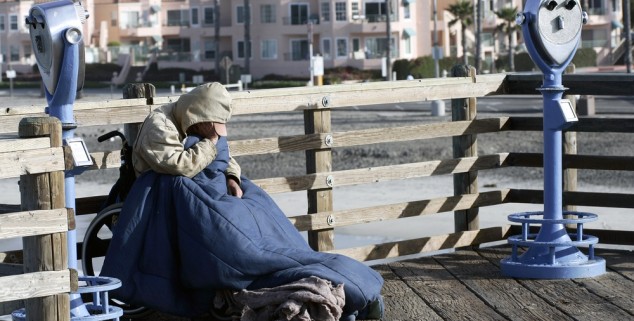Opinion
The high road: Dismantle the ‘wall of poverty’
 A homeless man in Oceanside. (Photo: David Little)
A homeless man in Oceanside. (Photo: David Little)In the darkest days of the state’s budget crisis, California’s most vulnerable – impoverished families, frail seniors, and people with disabilities – suffered blistering cuts to programs they counted on for their survival. They heard a clear message from Sacramento: we had no money, so we had no choice. With news this week that California’s tax revenues came in $6-$8 billion stronger than previous estimates, California now has an undeniable choice: a high road that lifts up all our people and strengthens our state, or a low road that ignores the nearly one in four residents who live below the poverty line in the wealthiest state in the nation.
The budget proposal Governor Jerry Brown released in January signaled his plan to stay the course on the low road. That plan acknowledged in words that the state’s growing economic inequality is a monumental challenge, but ignored the problem where it counts – in the dedication of resources to combat the staggering poverty that represents our state’s most daunting future liability.
When the Governor reveals his updated spending plan this week we can count on our schools seeing a significant portion of the new revenues. We will also see whether he will invest some of our state’s wealth in uplifting Californians currently living under constant stress of eviction, hunger, and little chance of success for their children – or whether these struggling Californians will remain squarely in Governor Brown’s blind spot.
Governor Brown has made repayment of creditors a top priority, but bringing down the Wall of Debt must not mean erecting a taller Wall of Poverty.
Today that wall stands in front of the one million young children who lack access to early education opportunities that help them prepare for K-12 education. It also stands in the way of childcare workers like Carolyn, from Oakland, who provide this necessity for our children, but who earn just $4.98 an hour on average themselves. Turning a blind eye to childcare workers and our children means spending more later to help our children catch up to their peers once they start kindergarten. Failing to invest in quality childcare today means holding their parents back from finding and holding jobs, and charging a future bill for the social costs of public assistance and criminal justice.
Zoila is the sole provider for her family of four in Lynwood, including her husband, who is disabled, and her two sons. Zoila works providing the around-the-clock, compassionate care for her son Rick, who lives with severe autism, so he can stay safe and healthy. When California slashed Rick’s care hours by 7%, Zoila didn’t give him 7% less care — no parent would. But the cut meant more sacrifice for a household already stretched to the limit. With a significant surplus on the state’s books, it’s unconscionable to expect California’s disabled citizens, low-wage workers, and the families they support to subsidize pre-payments to California’s creditors.
California needs leaders in the Capitol who have the vision, the credibility, and the political will to lead a new conversation about the roots of our poverty cycle and the tools California can use to break it. Surely Governor Brown, with his legendary imagination and relentless work ethic has the ability to tackle the California’s greatest liability of all: our extreme inequality and widespread poverty. And the California Legislature has new leaders who have demonstrated their commitment to including every Californian in our growing prosperity. Now, with this year’s revenue windfall, the Governor and the Legislature have the means to do so.
—
Ed’s Note: Laphonza Butler is President of SEIU California and SEIU United Long Term Care Workers.
Want to see more stories like this? Sign up for The Roundup, the free daily newsletter about California politics from the editors of Capitol Weekly. Stay up to date on the news you need to know.
Sign up below, then look for a confirmation email in your inbox.

Leave a Reply